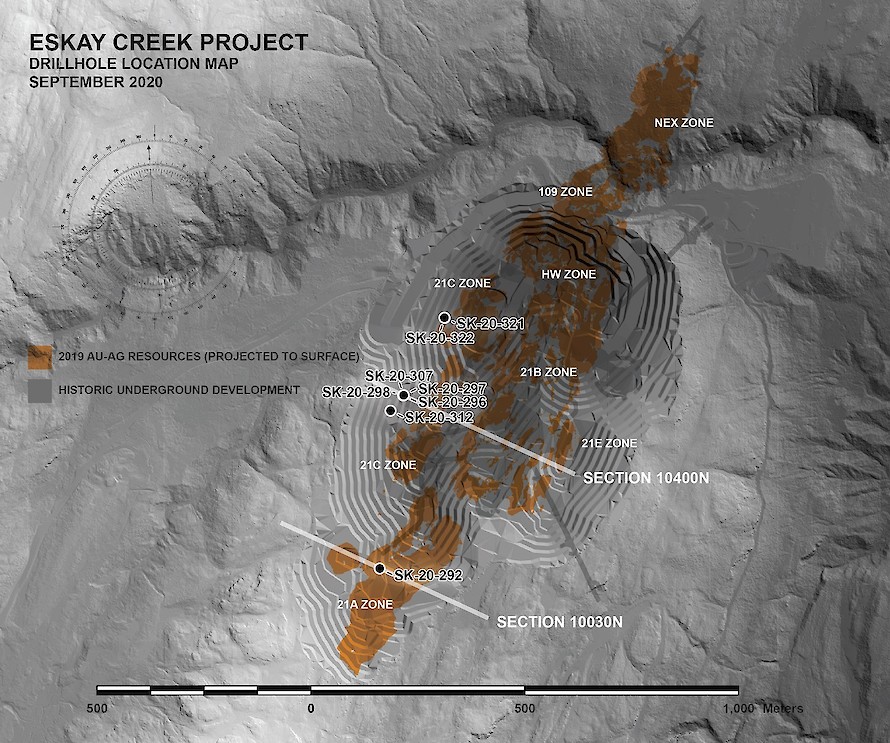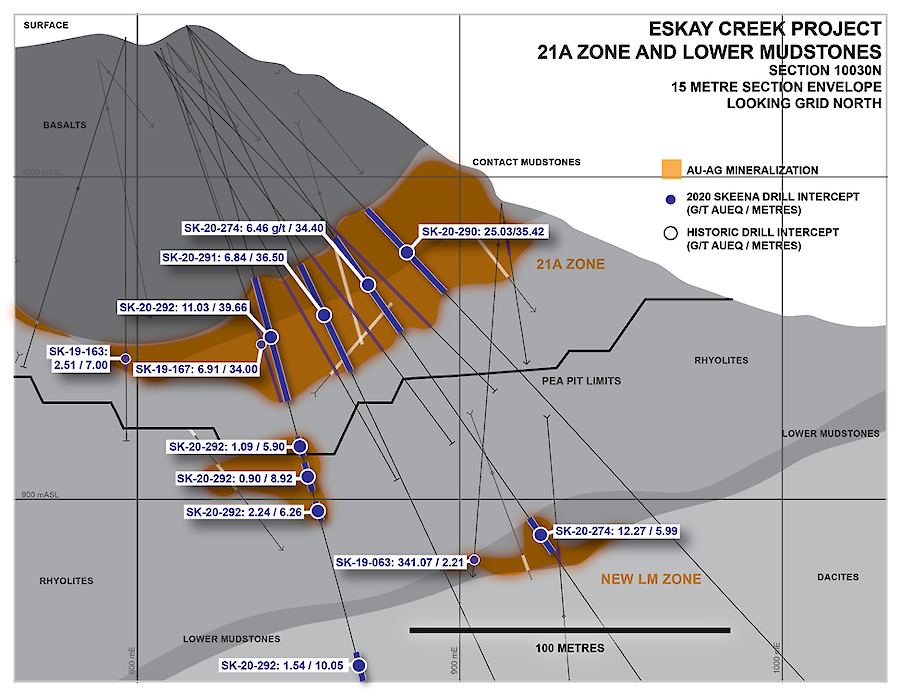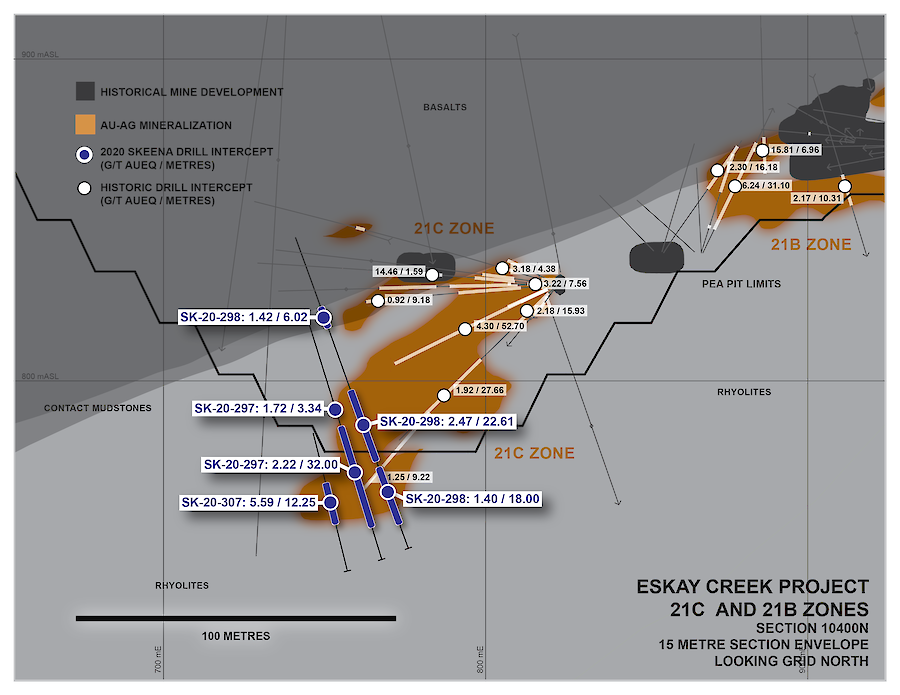NR:20-25
Vancouver, BC (September 9, 2020) Skeena Resources Limited (TSX: SKE, OTCQX: SKREF) (“Skeena” or the “Company”) is pleased to announce new gold-silver assay results from the 2020 Phase I surface drilling program at the Eskay Creek Project (“Eskay Creek”) located in the Golden Triangle of British Columbia. Six helicopter supported drill rigs are currently active for the 2020 Phase I program in the 21A, 21B and 21C Zones for Pre-Feasibility Study (“PFS”) resource category conversions. The Company is also drilling in the near-mine environment testing the Water Tower Zone (“WTZ”) and the largely underexplored Lower Mudstone sequences which lie beneath the Contact Mudstone that was historically mined. Reference images are presented at the end of this release as well as on the Company’s website.
Phase I Eskay Creek 21A and 21C Zones Infill Drilling Highlights:
• 5.05 g/t Au and 449 g/t Ag (11.03 g/t AuEq) over 39.66 m (SK-20-292) – 21A Zone
• 5.47 g/t Au and 9 g/t Ag (5.59 g/t AuEq) over 12.25 m (SK-20-307) – 21C Zone
• 3.59 g/t Au and 14 g/t Ag (3.77 g/t AuEq) over 16.50 m (SK-20-321) – 21C Zone
Gold Equivalent (AuEq) calculated via the formula: Au (g/t) + [Ag (g/t) / 75]. Reported core lengths represent 80-100% of true widths and are supported by well-defined mineralization geometries derived from historical drilling. Length weighted AuEq composites were constrained by geological considerations. Grade capping of individual assays has not been applied to the Au and Ag assays informing the length weighted AuEq composites. Processing recoveries have not been applied to the AuEq calculation and are disclosed at 100%. Samples below detection limit were nulled to a value of zero.
21A Zone Infill Drilling Intersects High-grade Silver Mineralization
The infill component of the Phase I program continues to confirm and increase the continuity and grade of the modelled mineralization in the 21A Zone as demonstrated by an intersection of 5.05 g/t Au and 449 g/t Ag (11.03 g/t AuEq) over 39.66 m (SK-20-292), as was expected by the geological concept model. Differing from the surrounding drill holes, which inform the current Mineral Resource Estimate (“MRE”), this drill hole intercepted a slightly thicker interval with a substantial increase in silver grades including 21.20 g/t Au and 7,190 g/t Ag (117.07 g/t AuEq) over 1.50 m and 11.35 g/t Au and 2,910 g/t Ag (50.15 g/t AuEq) over 1.30 m. For comparison, a previous intercept of 6.34 g/t Au, 42 g/t Ag (6.91 g/t AuEq) over 34.00 m (SK-19-167) was located only 15 m to the south of this new Phase I drill hole. This unexpected, extremely high-tenor silver mineralization is hosted entirely within intensely sericitized rhyolite breccias in the footwall to the Contact Mudstone.
Skeena continues to test the mudstone intervals which lie below the Contact Mudstone by extending SK-20-292 to a depth of 500 m into the Lower and Even Lower Mudstone sequences; however, only thin, weakly anomalous gold-silver mineralization was found. The key to locating higher-grade mineralization in these lower mudstone layers will be to use stratigraphic and geochemical information to vector into areas crosscut by the synvolcanic faults responsible for the Eskay Creek orebodies.
21C Zone Infill Drilling Continues to Confirm Modelled Mineralization
Current infill drilling within the 21C Zone is corroborating the modelled mineralization reported in the 2019 MRE, confirming grades and spatial distributions of the modelled zones. Gold and silver mineralization in this area is dominantly hosted within the footwall rhyolite sequence and is characterized by slightly lower grade and occurs within the deeper portions of the 2019 Preliminary Economic Assessment contemplated mining sequence.
“The Phase I portion of our 2020 infill drill program is now more than 50% complete and our team is eager to accelerate the upcoming Phase II program with additional drill rigs, providing results which are designed to add confidence to the currently tightly constrained resource base”, notes Skeena Exploration Manager Adrian Newton, P.Geo.
Paul Geddes, P.Geo., the Company’s Vice President Exploration & Resource Development adds, “In my experience, it is a rarity for a delineation drilling campaign on a precious metal deposit to consistently intersect the predicted mineralization defined by widely-spaced exploration drill holes. This success is not only a function of the Eskay Creek mineralization style, but also a result of the conservatively estimated MRE. Given the unanticipated occurrences of increased grades and thicknesses witnessed during the Phase I program, we are excited for the potential results of the Phase II campaign”.
About Skeena
Skeena Resources Limited is a junior mining company focused on developing the past-producing Eskay Creek gold-silver mine located in Tahltan Territory in the Golden Triangle of northwest British Columbia, Canada. The Company released a robust Preliminary Economic Assessment in late 2019 and is currently focused on infill and exploration drilling at Eskay Creek to advance the project to Prefeasibility. Skeena is also exploring the past-producing Snip gold mine.
On behalf of the Board of Directors of Skeena Resources Limited,

Walter Coles Jr.
President & CEO
Qualified Persons
Exploration activities at the Eskay Creek Project are administered on site by the Company’s Exploration Managers, Colin Russell, P.Geo. and Adrian Newton, P.Geo. In accordance with National Instrument 43-101 Standards of Disclosure for Mineral Projects, Paul Geddes, P.Geo. Vice President Exploration and Resource Development, is the Qualified Person for the Company and has prepared, validated and approved the technical and scientific content of this news release. The Company strictly adheres to CIM Best Practices Guidelines in conducting, documenting, and reporting the exploration activities on its projects.
Quality Assurance – Quality Control
Once received from the drill and processed, all drill core samples are sawn in half, labelled and bagged. The remaining drill core is subsequently securely stored on site. Numbered security tags are applied to lab shipments for chain of custody requirements. The Company inserts quality control (QC) samples at regular intervals in the sample stream, including blanks and reference materials with all sample shipments to monitor laboratory performance. The QAQC program was designed and approved by Lynda Bloom, P.Geo. of Analytical Solutions Ltd., and is overseen by the Company’s Qualified Person, Paul Geddes, P.Geo, Vice President Exploration and Resource Development.
Drill core samples are submitted to ALS Geochemistry’s analytical facility in North Vancouver, British Columbia for preparation and analysis. The ALS facility is accredited to the ISO/IEC 17025 standard for gold assays and all analytical methods include quality control materials at set frequencies with established data acceptance criteria. The entire sample is crushed and 1kg is pulverized. Analysis for gold is by 50g fire assay fusion with atomic absorption (AAS) finish with a lower limit of 0.01 ppm and upper limit of 100 ppm. Samples with gold assays greater than 100ppm are re-analyzed using a 50g fire assay fusion with gravimetric finish. Analysis for silver is by 50g fire assay fusion with gravimetric finish with a lower limit of 5ppm and upper limit of 10,000ppm. Samples with silver assays greater than 10,000ppm are re-analyzed using a gravimetric silver concentrate method. A selected number of samples are also analyzed using a 48 multi-elemental geochemical package by a 4-acid digestion, followed by Inductively Coupled Plasma Atomic Emission Spectroscopy (ICP-AES) and Inductively Coupled Plasma Mass Spectroscopy (ICP-MS) and also for mercury using an aqua regia digest with Inductively Coupled Plasma Atomic Emission Spectroscopy (ICP-AES) finish. Samples with sulfur reporting greater than 10% from the multi-element analysis are re-analyzed for total sulfur by Leco furnace and infrared spectroscopy.
Cautionary note regarding forward-looking statements
Certain statements made and information contained herein may constitute “forward looking information” and “forward looking statements” within the meaning of applicable Canadian and United States securities legislation. These statements and information are based on facts currently available to the Company and there is no assurance that actual results will meet management’s expectations. Forward-looking statements and information may be identified by such terms as “anticipates”, “believes”, “targets”, “estimates”, “plans”, “expects”, “may”, “will”, “could” or “would”. Forward-looking statements and information contained herein are based on certain factors and assumptions regarding, among other things, the estimation of mineral resources and reserves, the realization of resource and reserve estimates, metal prices, taxation, the estimation, timing and amount of future exploration and development, capital and operating costs, the availability of financing, the receipt of regulatory approvals, environmental risks, title disputes and other matters. While the Company considers its assumptions to be reasonable as of the date hereof, forward-looking statements and information are not guarantees of future performance and readers should not place undue importance on such statements as actual events and results may differ materially from those described herein. The Company does not undertake to update any forward-looking statements or information except as may be required by applicable securities laws.
Neither the Toronto Stock Exchange nor the Investment Industry Regulatory Organization of Canada accepts responsibility for the adequacy or accuracy of this release.
Table 1: Eskay Creek Project 2020 Phase I length weighted drill hole gold and silver composites:

Gold Equivalent (AuEq) calculated via the formula: Au (g/t) + [Ag (g/t) / 75]. Reported core lengths represent 80-100% of true widths and are supported by well-defined mineralization geometries derived from historical drilling. Length weighted AuEq composites were constrained by geological considerations. Grade capping of individual assays has not been applied to the Au and Ag assays informing the length weighted AuEq composites. Processing recoveries have not been applied to the AuEQ calculation and are disclosed at 100%. Samples below detection limit were nulled to a value of zero.
Table 2: Mine grid Phase I drill hole locations and orientations:



